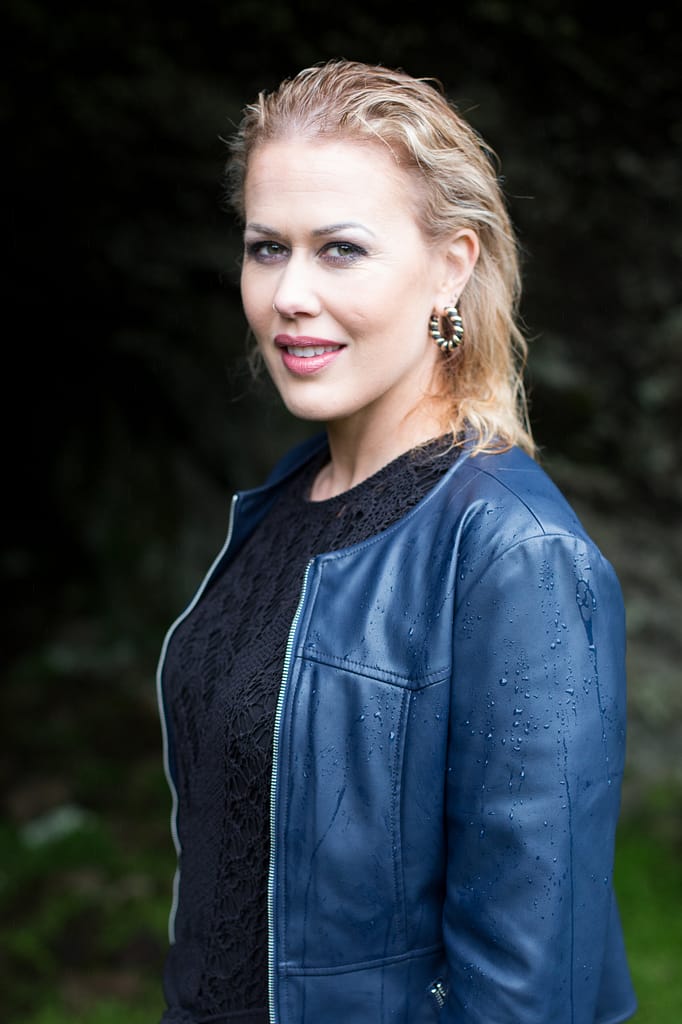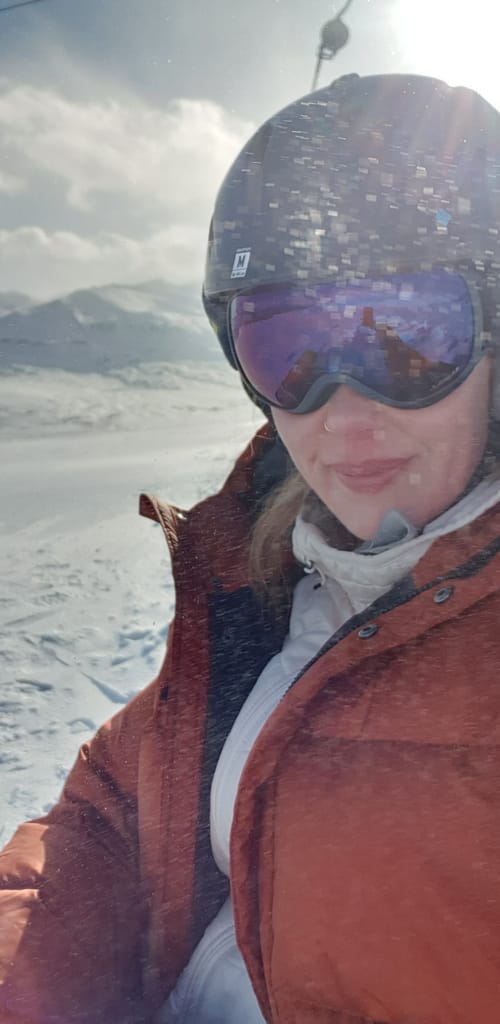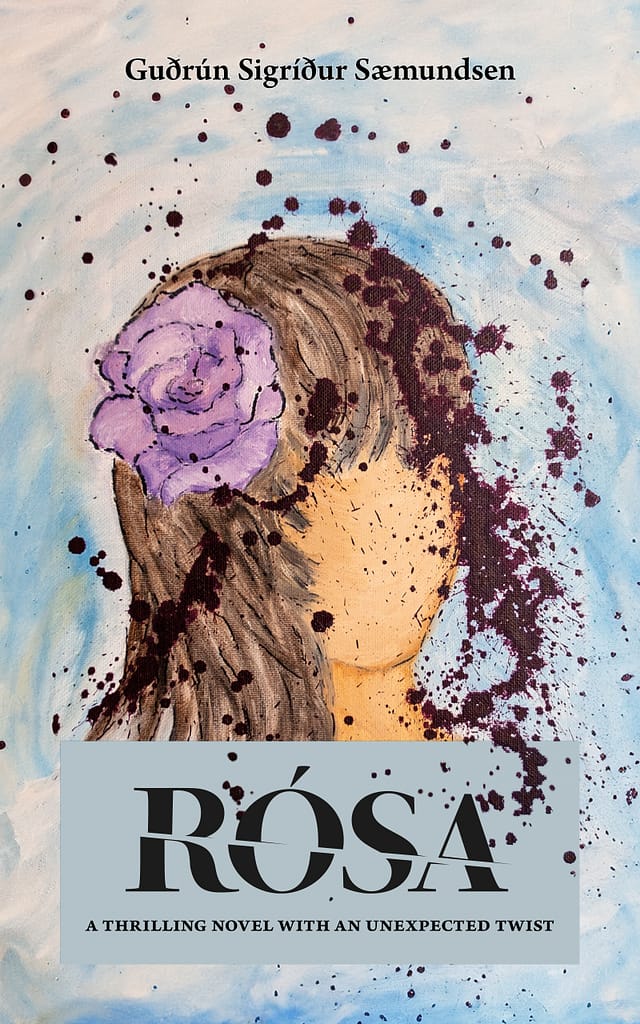Disclosure: If you buy books linked to our site, we may earn a small commission from Amazon.
Meet the Author – Guðrún Sigríður Sæmundsen

In this episode of ‘Lit Talks’ we sit down with Icelandic self publishing indie author Guðrún Sigríður Sæmundsen, to discuss her third novel ‘Rósa‘ – a psychological thriller about a young woman who’s seeking the truth after suffering a series of blows in her life.
Guðrún, thank you so much for take the time to talk with us. Could you start by telling us a bit about yourself and your background?
You’re very welcome. My name is Guðrún Sigríður Sæmundsen and I am a self-publishing author from Iceland. I am a single mother living in Reykjavík metropolitan area with my two children and two cats.
Rósa is my third book; I self-published it in Icelandic at the end of 2021. The book has been translated to English by Björg Árnadóttir and Andrew Cauthery (2024), and I recently published it on Amazon in kindle and paperback.
Previously I self-published Andstæður (Opposites) (2018) and Hann kallar á mig (He Beckons Me) (2015). These books are also available on Storytel Iceland. Hann kallar á mig was nominated for the audio book awards, Storytel Awards, in 2021.
Currently, along with writing and publishing, I work at the National University Hospital of Iceland. Before, I worked in finance and marketing, and prior to the work at the hospital I worked as a cultural and scientific representative at the French Embassy in Reykjavík.
I finished my bachelor’s degree in business from Reykjavík University in 2006 and after a one-year break from my studies I moved to Grenoble in France where I studied master’s in international business at Grenoble Graduate School of Business. While writing my master’s thesis I lived in Brussels for 6 months and did a trainee program at the European Free Trade Association (EFTA).
The days can be demanding: the hustle and bustle of work, driving to ferry the children to and from nursery and school. All the things that need doing back home after work — and don’t forget to feed the cats. Then the lovely times with the children in bed in the evenings when we read a book together and I tell them stories. That’s life. When all is calm and the children are asleep, I sit at the computer in candlelight while sleet hammers at the window. Then I lose myself in my imaginary world, entering into a total other consciousness and let myself flow.
Tell us a bit about your third novel, ‘Rósa’, what can readers expect?
I do hope that my readers get goosebumps, just like I got at times while writing the novel. The readers can expect excitement mixed with drama, and scenes where they must figure whether the main character is experiencing real life situation or illusions.
The central character Rósa‘s existence is permeated by alienation from reality, she does not realise on which side of the line she is standing. While the life of her best friend Díana seems to be perfect, Rósa incessantly tries to dig deeper in order to find answers to events that happened a few years back. Everything that happens or has happened becomes a question: Is this actually based on reality?
When Elvar, Rósa‘s former fiancé and the father of her child, is found murdered, Rósa starts to doubt her own innocence, until the truth is eventually revealed.
Delving deep into the text, the story revolves mainly around Rósa’s and Díana’s friendship and the conflicts that sometimes arise in close friendships. How in the innocence of youth, diverse personalities are attracted to one another and how the passage of time and changed circumstances can bring about emotional distancing between former close companions; jealousy and constant comparison, treachery and lusting after what one’s counterpart has.

I’ve read the book, which is so intriguing and a real page turner! It deals with some sensitive subjects like loss, and mental health. How did you go about writing about these delicate matters?
Thank you, I really appreciate your positive feedback. A “real page turner” is something a writer likes to hear.
I write about things that spring to mind: About the people on the margins, creating memorable characters with a strong voice. I want the story to fire people up and for the work to leave something behind. Perhaps something that frightens me or leaves me wondering during the day.
In general, I am very curious about people and their situation. I always want to know more about their background, childhood, and why their life has evolved in this or that way. What is on their mind. Even when sitting at a café, I would look around and imagine about the life of the people passing by. It might sound weird but is just my passion.
I want to explore, and I don’t like to get stuck to a certain genre. For an example the genre of my first two books is excitement/ drama on a completely different level from Rósa.
Usually, the ideas come in the middle of the process of my current novels. So, I could be finishing a novel or writing a novel, when somehow the idea of the next one comes to mind. And you could say that the “story” doesn’t leave me alone until I have put it on a paper.
How much research was involved in writing the book?
The same amount of research as I have done for all my books. Although, I am writing a fiction, with fictional characters and narrative, I do want it to get as close to the reality as possible. So, the reader might think “Oh, that could actually happen to me, or in my own home …”
For this book I did research on the Internet. Since this was the first time I wrote a psychological thriller, I had to find out how to build up a good thriller.
To create the main character, I interviewed a doctor; to get insight into a person’s mind who is suffering from a mental instability, what happens when the person is mentally ill, what is the difference between some types of mental disorders, what kind of medication the person would need etc. I also interviewed a former member of the police forensics to know a about the procedure on a murder scene and what happens when someone dies in one’s own home. I also got some feedback from my babies father who is a lawyer, on the lingo and procedure for a suspect of a crime. These are the things that need to be right, to enhance the reader’s experience.
Have you found it difficult getting your books noticed by a wider, english speaking audience? What challenges have you faced?
Well, in general, as a self-publishing author it is a bit tricky to advertise your own work; it might be because of a less budget but also because the author is the only voice. Like saying “Hey, I wrote this book, and it is really good so you should read it.” I bet everyone that has written a book wants to do that. When having a publisher, the authors have stronger voice; someone to back up their work. By time I have managed to receive more ratings and reviews to support my work and that is also something that matters.
English is not my mother tongue so that is even more challenging. However, the translator of Rósa has helped me with some texts regarding the introduction of the book. I have been running some ads on social media and I find that the English-speaking audience is open minded and interested to explore my work.
You certainly need courage to self-publish, as well as foresight and focus. I always do my best, I never hand anything in unless I am one hundred percent happy, and I have faith in what I do.

Have you always been an avid reader yourself, and if so, what’s the first book that got you hooked on reading?
Yes, I have read books since I was a child. I feel good when reading and I read a lot on vacations and always in bed before going to sleep. Those who know me well know that I get stressed when travelling if I forget the book I am reading at that time.
I love when I pop into a book that affects me and leaves me wondering throughout the day. When the narrative draws me in.
The first book I remember being hooked on was Black Beauty when I was a child. There was something catching about the cruelty vs. kindness towards the main character Black Beauty (or Fagri Blakkur as it is called in Icelandic). I still remember holding the book in bed at night staring at the cover, on the animated picture of the beautiful black horse.
As you know, Literary Gents is about encouraging the discovery and joy of reading. What would you say to encourage people to begin their reading journey?
I recommend having the books visible in your home. There is something very cozy and homey about books and bookshelves. Be open minded, don’t only read the bestsellers (although it is tempting), there is more to explore. Ask people around you, what they have been reading and whether they have any recommendations.
Please don’t say to yourself or others that you don’t have time for reading (I have heard people say this way too often). There is always a time for everything in life. You don’t have to read for an hour, 1-2 pages is enough. Read whatever you can get through at each time. Scroll less in your phone and pick up the book instead, it is not only better for your eyes but also for your mentality. Reading is actually quite calming. And last but not least, make the reading journey nice: Sit in your favourite chair, with a cup of tea and a candlelight. Lie in your bed with a lamp on the side and soak yourself in the story before sleeping. Even in the nature, outdoor, in the sun. We definitely do not always have the weather here in Iceland to read outdoors but one of my favourite things, when travelling to a sunny place, is to lie on the sun bench and read.
Use different sources; libraries, audiobooks, kindle … Whatever suits you.
What’s next for you after ‘Rósa’?
I already started my fourth novel which is a sequel to my first book Hann kallar á mig. I plan to publish it next year. I even have an idea on my fifth novel. I will continue to follow-up the English version of Rósa, market it and attract more readers. I recently got a publisher for Rósa in a very exotic European country, and I will have to follow-up on that as well. Hopefully, in the near future, I can also finance an English translation of my first two books. There is always enough on my plate, thankfully, and I will continue to expand and focus.
Thanks again for taking the time to talk with us, we wish you every success with ‘Rósa’.

As we conclude this journey into the gripping world of “Rósa” by Guðrún Sigríður Sæmundsen, we’re left with an insatiable appetite for more. This psychological thriller promises to keep you on the edge of your seat until the very last page, with its intricately woven plot and compelling characters. Don’t miss out on the chance to immerse yourself in this Icelandic gem of a novel. Get your copy of “Rósa” today and prepare for a thrilling ride into the depths of the human psyche.